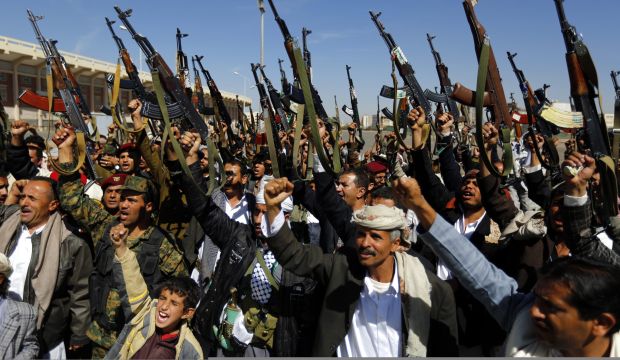Operation Decisive Storm, which is being backed by most countries across the world, is not a battle against the Shi’ites. Although this is certainly how the Houthis want to portray things, along with all other parties in their orbit, from Iraq’s Popular Mobilization forces and Hassan Nasrallah’s Hezbollah to, of course, their common backer: Iran. However, in reality, this is not a war against the Shi’ites, but a war against a rebel group that is being sponsored by a state whose strategy is based on exporting sectarianism across the region. This same country is portraying itself as the “grand protector” of Shi’ites everywhere—politically and doctrinally—as if these Shi’ites don’t have homelands of their own that can protect them from the lies of the Persian state.
There is a cacophony of sectarian discourse being put forward by Tehran’s agents in the region. Can you believe that Hezbollah’s Hassan Nasrallah or Houthi leader Abdul Malik Al-Houthi are complaining about sectarianism? We have even heard similar statements from commanders in Iraq’s Popular Mobilization forces. In other words, commanders of a military force that is formed along sectarian lines are now accusing others of sectarianism. I can only say that those in glass houses shouldn’t throw stones!
Saudi Arabia and its Gulf allies for decades dealt with Zaydi former president Ali Abdullah Saleh, in addition to supporting the Shi’ite religious authorities in Yemen, while Riyadh also enjoyed excellent ties with former Syrian President Hafez Al-Assad, who was an Alawite. Gulf states do not frame their relations with other states according to sectarian or religious identity, although this is clearly something that the mullahs’ regime in Tehran is doing. Gulf states have never targeted their Shi’ite citizens or dealt with them any differently, even if they are minorities. Rather, Gulf states have granted them the exact same rights as the rest of their citizens, as opposed to Iran which deals with its own Sunni community as second-class citizens, oppressing them and depriving them of their rights, and even preventing them from building houses of worship. Gulf states have never committed any violations against their own citizens, whatever their sectarian or doctrinal identity. The same cannot be said of the Shi’ite militias in Iraq and how they are dealing with the country’s Sunnis, and this is something that is happening in full view of the Baghdad government.
Tehran has had limited success in establishing cells in Arab Gulf states, with the majority of its enterprises with Saudi Arabia and the Gulf’s Shi’ites ending in failure. The vast majority of the Gulf’s Shi’ites are loyal to their homelands, and are not known for possessing any bias towards, or support of, Iran. Moreover, Tehran is known for placing Persian Shi’ites above Arab Shi’ites. This is something that is confirmed by Adel Al-Labbad, a Saudi poet and writer who is a former member of the Islamic Front for the Liberation of Bahrain, and spent six years of his life as part of a secret military cell in Iran and Syria. In his book Coup d’Etat, he writes that the Iranian racism towards Arabs was well-known and that some Saudi members of Iran-backed groups, like himself, would pretend to be Iraqi or Lebanese, rather than admit to being Saudi, even if they were Shi’ites.
The treatment of minorities remains a very sensitive issue in the West, and sympathy is always on the side of the minorities, even if this issue is exaggerated. So how could states like the US, Britain and France support the Saudi-led coalition if it were based on a sectarian strategy?
It is the Iranian regime that is built on a sectarian approach, and there is ample evidence and proof of this fact, but it seems that Tehran and their allies have become adept at pointing the finger of accusation at others, in order to cover up their own sins.
